|
Cover
Story
 Street
Real Street
Real
Ahmede
Hussain and Kajalie Shehreen Islam
Avoiding
the prying eyes of the Ticket Checkers and Rail Police, nine-year-old
Anwar, along with his younger brother Heron, sneak onto the
night train everyday to come to Kamalapur Rail Station. The
duo's long and laborious journey into the dark night starts
from Kishoreganj where they used to lead a modest life with
their mother until Anwar was diagnosed with tumours in the
neck and armpit. Their father, who was the only bread earner,
died two years ago. Now, with nowhere to and no one to help
the family out, young Anwar picks through the city's garbage
everyday to earn enough for a surgery.

Heron and his elder brother Anwar come from Sharong village
of Tarail thana, Kishoreganj. Anwar has tumours in his
neck and armpit |
Still
a toddler, Heron sits on the pavement of the station and waits
while Anwar staggers through the city street, searching for
empty mineral water bottles or anything sellable. Save for
a plastic bagful of old clothes, the two brothers do not have
anything to guard against the thugs and goons that roam around
the capital. A month since their first journey, Anwar has
not been able to save a hundred taka. Yet his eyes glint with
hope and desperation. "I want to live," he says,
"I don't want to die."
Children like Anwar are the invisible majority in this city
and they have their own stories to narrate. It is a story
of shocking deprivation and abject poverty. It is a tale of
a city, where flashy sport-cars speed through the streets
where children like Anwar stare at the window under a hostile
sun, waiting for an empty water bottle to be thrown at them.
It is a story of a country where it is a crime to be born
poor.
A
bunch of children gather together at Mohammedpur Beri Baadh.
Some are flying kites, some on their way to school, others
are running errands.

Shajib (L) and Siddique (R) left home without even telling
their parents and now work as porters at Kamalapur Station |
Rubel,
a 10-year-old, lives with his "ostad" from whom
he learns to work on automobile engines. One of his brothers
is a truck driver, the other works at a factory nearby. Rubel
goes to school at Mary Stopes but is not interested in getting
an education. "I just want to learn the trade,"
says Rubel.
Yasmin's
father is a CNG-run autorickshaw driver who makes some two
to three hundred taka a day. Yasmin is a student of Class
8 in the nearby city corporation-run school. "I want
to be a doctor when I grow up," says Yasmin brightly.
Jhunu
is a student of Class 1 at the same school. "My father
is a ferry-wallah (vendor)," she says. "He
sells paper." Jhunu's father makes around 50 to 60 taka
a day. Jhunu is the only child of her parents. Asked what
she wants to be, she doesn't hesitate for a second before
saying, "A police inspector."
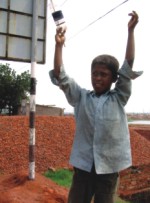
Rubel, whose father abandoned the family a long time ago,
manages to keep a cheerful face. He goes to school and
his brother, a bus helper, earns just enough for them
to survive. |
Robu,
probably not more than six or seven years old, is dressed
in nothing except a green lungi. "My father is a rong
mistri (house painter)," he says. "My mother
used to work as a maid but doesn't anymore." Robu's parents
want to send him to school. But students have already been
admitted into the current year, argues Robu, and he doesn't
want to go. "I want to be a rong mistri like
my father," he says.
A
school dropout, eight-year-old Miraj helps his father grease
cars at a workshop in Mohammedpur. "The boy who used
to run errands for my dad quit the job to go back to his village,"
Miraj says. Teachers at the UCEP school he had been going
to, requested Shuruj Mia not to stop his son's studies. "But
my father doesn't have any other way," Miraj says, "Ours
is a very big family."

Platform 8 at Kamalapur Station has been Shathi's (L)
and Shefali's (R) home for years. |
The
child wants to be a doctor, but does not know how this will
be possible. He is not sure either when he will be able to
go back to school. "My father's income alone is not enough
for the family, we have to pay a house rent of Tk 400,"
he says.
Every
day the child, still a toddler, wakes up early in the morning
and follows his father to the workshop near the Town Protection
Dam in Mohammedpur. For him, the workload remains high as
more and more dented reconditioned cars pour into the workshop.
"I hardly get any time for play," he smiles.
When
he gets any, Miraj goes to the courtyard of an abandoned house
nearby to play football with friends. "I love to keep
the goal for my team," he says.
Among
about a hundred children that work as porters at the "Rail
Station" for a meal is Shuhag. The 11-year-old fled home
a year ago after his father died of liver cancer and mother
Kohinoor "couldn't feed six mouths alone". The first
day in Dhaka was harrowing for Shuhag, who had never stepped
outside Comilla before. "There were already more than
enough luggage careers in the station," he says, "some
of them even beat me up".

Eight-year-old Miraj is a school dropout and the son of
a poor car workshop worker. He still dreams about being
a doctor. |
Policemen,
on the lookout for some quick bucks, swooped on the porters
who worked without a permit. To become a "legal porter",
apart from around Tk 10,000 that will go as bribes, Shuhag
says he has to pay the government a lump sum amount of Tk
1,000.
That,
however, remains a far cry. "I only earn Tk 30 a day;
sometimes even less than that," he says. Earning two
meals a day remains a regular struggle for the young porter.
A set meal of rice and egg curry, sold at Tk 8 at the roadside
restaurant, is usually what Shuhag has for lunch.
The
law enforcers remain a nagging pain; but over the years, the
child has learnt his lessons in wrestling with the bribe-hungry
police. "Police do not cause much problem nowadays,"
Shuhag smiles and waits for the next passenger train to arrive.
It is one in the afternoon and the sun is at its harshest;
Shuhag's hands are blistered, his back aches as he takes two
suitcases of a
passenger
over his shoulder. "I want to be a mechanic; one day I
will be able to save money to go to a technical school,"
he says and walks into the crowd.
Outside the entrance to Kamalapur
Rail Station, 10-year-old Abu Baqar Siddique waits to

A baby lies unattended at a platform at the "Rail Station". |
transport luggage. Siddique
has no father, and his mother works in the fields back in
Kurigram. One day, about a year ago, while playing back in
his village, he mistakenly got on the train to Dhaka. He hasn't
returned since, and his mother doesn't know where he is. "She
must cry for me," reflects Siddique.
In Dhaka, the boy lives in
"Mugda Club" where he is given three meals a day
for Tk 25 and where he pays Tk 30 as "joma". At
the station, he makes around Tk 50 a day. When he makes less
than he has to give, he pays the "joma" and eats
5 taka's worth a meal that day. Siddique goes to the Aparajeyo
Bangladesh school nearby but is not in any formal class, though
he studies Class 1 texts. When he grows older, he wants to
do a "bhalo chakri" (good job). "Maybe I can
work at a house," he says, "do their bazaar and
all. Or maybe I could run a shop." The dust all over
Siddique's face does not hide his sweet smile, but his eyes
seem to be groping for a stronghold as he tries to focus on
his dreams.

Kids of all sizes gather outside shopping centres to beg
or take loads from shoppers. |
Shajib, a tiny boy in shorts
who claims to be 11, takes his place beside Siddique, eager
to tell his story. He has no father either, he says. His mother
lives in Sylhet. A boy named Ronnie lured him to Dhaka around
three months ago, promising him food, lodging and a job which
would pay him Tk 300 a month. Shajib got on a train with Ronnie
without even telling his mother that he was leaving.
After reaching Kamalapur Station,
Ronnie was nowhere to be found, and Shajib was on his own.
"I didn't know anyone or anything in Dhaka," says
the boy. He slept at the station, but there was an initial
hassle with the people there, about whether he could live
and work there. Finally a deal was reached by which he could
take two "bojhas" (loads) of luggage a day which
would pay him Tk 5 each and he could sleep at the station.
But even here it's not safe, not even for the residents, for
Shajib himself has been pick pocketed a number of times by
other boys who also live here. One night he lost 50 taka to
pickpockets. Shajib also goes to the Aparajeyo Bangladesh
school and wants to be a "boro (big) officer"
when he grows up.
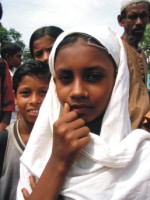
Jhunu, a student of Class 1, wants to be a police officer
when she grows up. |
Twelve-year-old Halima lives
with her parents in a slum near Kamalapur Station where she
was born. Her father is a rickshaw-puller who makes 25 taka
on some days and 100 taka on others. Halima's mother used
to beg but she doesn't anymore. Halima has a sister and two
brothers, but they're too young to go to school so she is
the only one who goes. "My parents want me to work at
an office," she says, "and to grow up to be a good
person." The girl shies away at the mention of marriage
but her smile still lights up.

Twelve-year-old Halima (L) and Lucky (R) want to be "good
human beings" when they grow up |
Does her family get by on
what her father earns, Halima is asked. Yes, she says. "Sometimes
we eat fish, at other times, alu bhorta (mashed potato).
Sometimes we have to take "baki", though,"
she says.
At Platform 8 sit two mothers
with their babies. Shathi's son is 13 months old and Shefali's
daughter, three years. Shathi has been living at the station
for 10 years. She used to beg but stopped after getting married.
Her husband used to work for WASA, where he used to make around
200 taka per day, but now he does construction work at the
station and gets about 100 taka. Shathi wants to send son
Rafiqul to a hostel when he is older and educate him there.
"His dada (grandfather) is an officer at a bank,"
she says, "I will send Rafiqul to him."
Shefali is from Jessore and
has been living at the station for the past four years. She
is pregnant with her second child. She wants her daughter
to become a doctor. Her husband also does construction work
at the station and makes between 100 and 150 taka a day.

Their small hands carry big burdens, their lives as uncompromising
as the city's streets |
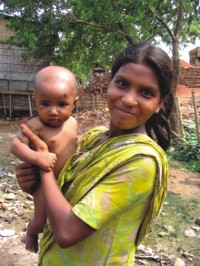
Life goes on in the streets. Children grow up, become
mothers, continuing the cycle |
There is no place to cook
at the station, so both women have to buy their meals, which
usually range between rice, bread and bananas. It's more expensive
to buy their food, they say, but they don't have a choice.
Sometimes they spend over a hundred taka -- all that they
make -- in a day. "On other days we can save a little,"
notes Shefali.
Life is a little better for
Lucky who lives in a slum in Bashabo. Her father is a decorator
and, thanks to a school run by Aparajeyo Bangladesh, she can
carry on her studies. Lucky has two sisters and a 10-month-old
brother, Ashraf, whom she takes out for a stroll in the evening.
Asked what she wants to be, the nine-year-old says, "Ami
manush hote chai." In a world torn between honesty
and
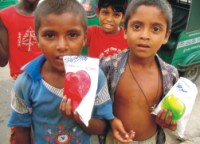
For these little candy-sellers, life is far from being
sweet |
high ambition, it is, indeed,
difficult to remain a good human being.
Most of the children are baffled
when asked what
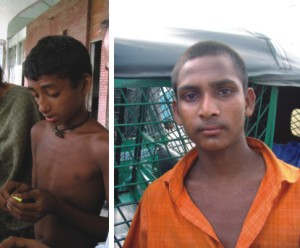
Shuhag (L) who sleeps on Platform 8, left home when his
father died of cancer and his mother could no longer feed
him. Suhail (R) ran away from home in the hope of being
somebody. He ended up being a 'coolie' at Kamalapur Rail
Station. |
they want from life. For them,
it is more a question of getting by each day: Managing a couple
of meagre meals for themselves and sometimes even their families;
surviving the heat and braving the storms in polythene homes.
Their dreams, like their lives, are limited to slums, pavements
and railway platforms across the city. Even before reaching
their teens, their eyes, instead of sparkling with hope, are
blurred with uncertainty. With the helplessness and hopelessness
of being trapped in a reality from which there is no way out.
Copyright
(R) thedailystar.net 2005 |
| |
